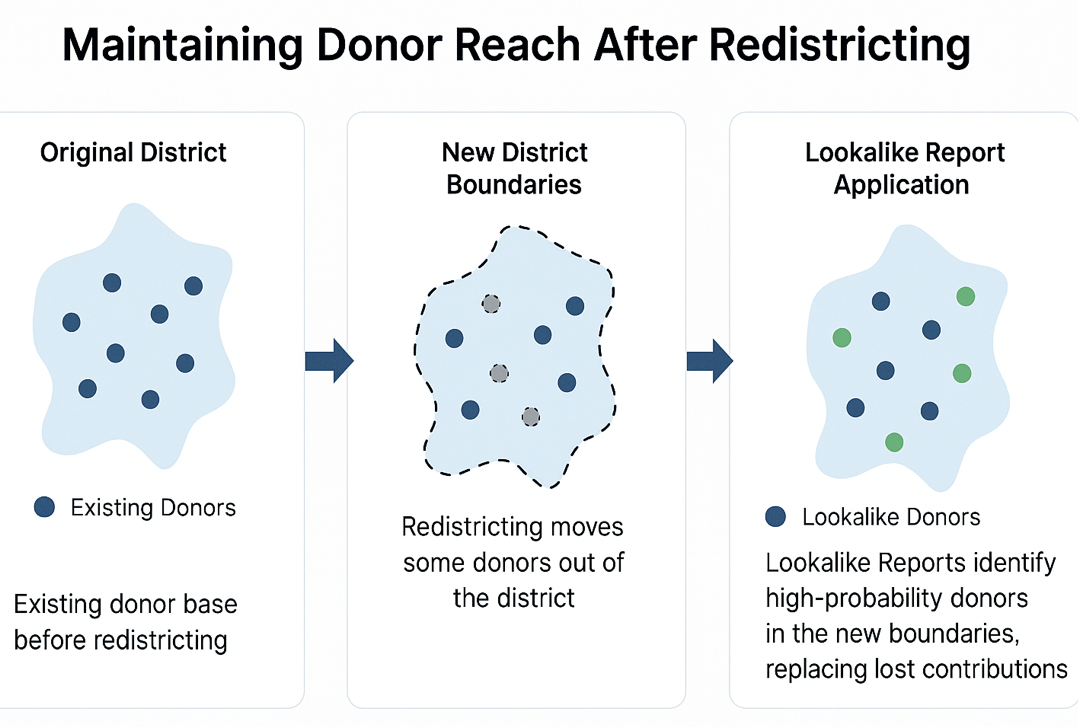The ’26 Redistricting Fight Puts Political Data in the Spotlight


Texas Republicans’ decision to redraw congressional maps ahead of the 2026 midterms has prompted other states, including California and Missouri, to consider similar moves. These changes will alter the boundaries of who campaigns can reach and how resources are allocated.
In this environment, access to accurate, up-to-date data becomes critical. Reliable voter and demographic information allow campaigns and organizations to adjust their outreach, optimize paid media, and refine fundraising strategies based on the new district lines. Here’s what to look for in a data vendor to help with your voter outreach, paid media and fundraising:
Historical Leadership
Not every data vendor has experience tracking Americans’ migration, but having that historical perspective will be key to understanding the shifting landscape.
We have a 40-year history tracking U.S. migration from state to state, county to county all the way down to the Census block. Our data comes from several sources, including our internal monthly consumer updates that capture changes by address, name, phone and email. This information is supplemented with data from Cicero, public deed records, utilities, credit sources, magazine subscriptions, and other trusted partners.
Our reports have been so popular that Bloomberg recently relied on Melissa when telling various American migration stories.
Now, voters may find themselves having migrated to a new congressional district without packing a single box. Knowing who’s new to a district — whether a voter or a donor — will be key for campaigns this year and next.
Knowledge Of the Industry Landscape
Data vendors in the political space often advertise broad capabilities, but campaigns and agencies gain the most value from partners with specialized expertise.
In the context of fundraising, that means identifying donor prospects who statistically resemble an existing base of supporters. When provided with a candidate’s house file, our platform generates Lookalike Reports that surface high-probability donors based on demographic and socioeconomic variables such as age, ethnicity, and income. This process significantly reduces acquisition costs by prioritizing outreach to individuals most likely to respond.
Now, redistricting introduces an additional layer of complexity. Newly drawn district boundaries can significantly alter the donor landscape, placing established supporters outside of a candidate’s new jurisdiction while simultaneously introducing populations that have had little prior exposure to the campaign. For example, a candidate in Texas might see 15 percent of their previous donor base fall outside the updated district lines. Using Lookalike Reports, the campaign can quickly identify similar donors within the new boundaries, effectively establishing a reliable fundraising base in previously untapped areas.
From a modeling perspective, analytics teams must recalibrate propensity scores and voter likelihood models to reflect the revised boundaries. By integrating Melissa’s data into these models, campaigns can identify and prioritize individuals whose characteristics align with high-value supporters from prior cycles. This ensures that strategic decisions on outreach, paid media, and fundraising remain data-driven, even as the electoral map evolves.

Ensuring Paid Media Efficiency
Reaching voters by congressional district — especially in sprawling, fast-changing areas like Southern California’s Orange County — is challenging even under ideal circumstances.
With campaigns increasingly running multi-channel media programs, having accurate data is no longer optional. In fact, it’s essential. Without it, you risk wasted ad spend, mismatched targets, and missed opportunities under the new congressional maps.
That’s where we can help. We’ll provide you with an updated voter list, or refresh your existing file with the latest contact details for voter’s who’ve shifted districts due to redistricting – including mobile/landline phone numbers and current email addresses.
For example, in a recent redistricting cycle, a campaign we worked with found that nearly 12 percent of their target households had been reassigned to a different district. By updating their voter file with new addresses and verified digital contact points, they were able to adjust their media buy within days. Instead of wasting impressions on the wrong voters, they redirected those dollars toward the correct audience — saving budget and improving outreach efficiency.
With cleaner, current data, your team can target with confidence and ensure every dollar is working as hard as it should.
Real-Time Accuracy
Campaigns are starting earlier than ever, which means every week counts — especially when it comes to data. That’s why we custom built the Melissa Alert Service for political: it helps agencies and committees quickly identify every address in a district, whether voters were shifted by redistricting or have simply moved into the area.
With real-time updates on who’s living at those addresses, campaigns can adjust their targeting immediately. That means fewer wasted dollars on outdated lists and more opportunities to connect with the right voters early, before the competition does.
In addition to the core functionality you’d expect from a cloud-based DBMS, Melissa Alert Service offers powerful tools that make voter data easier to manage and keep current:
- Cloud-based data storage for always-available access
- Flexible, user-defined schemas and unlimited tables per user to fit your data needs.
- Web-based WDP portal application for intuitive access
- User-scheduled jobs with notifications of data changes so you never miss an update
- Transaction tracking for transparency and accuracy
- Full data operations (select, match, update, insert, delete) via web interface or FTP
- Automated data processing to save staff time and reduce manual work
If you’d like to see how it works in action, reach out to us here for a complimentary demo of the platform — and get a head start on keeping your data one step ahead of the maps.
Dong Vu is the Director of List and Reference Data at Melissa. Fulbert Chan is Director, Data Services at Melissa.



